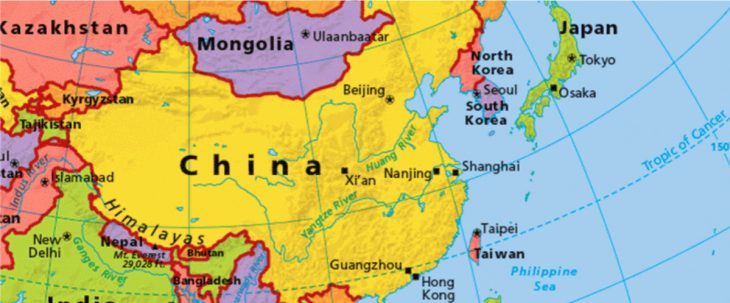Rep. Crawford dubious of Chinese investments in U.S., Arkansas
by September 30, 2019 7:11 pm 1,833 views

U.S. Rep. Rick Crawford, R-Jonesboro, said he has concerns about Chinese investments in America, despite six Arkansas projects – including three in his Congressional District – being supported by Chinese investors.
In an interview with Talk Business & Politics, Crawford outlined his reasons for concern with those economic projects.
“I have concerns about Chinese investing in the United States for a variety of reasons. Obviously, there’s national security reasons,” Crawford said. “At the fore is the Chinese threat, not only in the business world where they attempt to steal everything they can – intellectual property, forced technology transfers. We had five researchers indicted in the state of Arkansas just over a year ago for stealing rice research from the Rice Research and Extension Center. This doesn’t just happen in Arkansas. It happens all over the country.”
Arkansas has seen in-state announcements of six projects with Chinese investors, including the $1.5 billion Sun Paper Co. project near Arkadelphia. Crawford’s district includes three Chinese-related economic development projects:
• Risever Machinery – 130 new jobs in Jonesboro;
• Dragon Woodland – 75 new jobs in Helena-West Helena; and
• Shandong Ruyi Technology – 800 new jobs in Forrest City.
”If they’re able to make these kinds of investments in states like Arkansas and other parts of the United States, why are they given preferential treatment as a developing economy in the WTO [World Trade Organization], which is having a negative impact on our economy?” Crawford said. “I can tell you, if you’re investing billions of dollars outside of your own country, you have arrived. You don’t need special treatment. They should be on the same footing as the United States, as the EU and other countries that are not developing but are in fact developed economies, and so they shouldn’t be given special treatment.”
Crawford questioned the Arkansas investments and said he’s worried about theft of technology and research.
“I think there’s a strategic concern there. There’s obviously the academic institutions as the Confucius Institute has become a major source for embedding researchers into academic institutions, students into academic institutions whereby those individuals can steal technology and apply that in their own production back home in China. They’re not honest brokers. They’re not here to help us. I have concerns about it,” he said.
Crawford continued: “I’m not trying to be a naysayer. I’m not trying to throw cold water on economic development. In fact, I’m all in for economic development. I think we ought to be looking at ways that we can grow our own and capitalize on our own ability here to pull ourselves up by our bootstraps. You know, we mentioned the issue in Forest City. I think it’s important that we do invest in our ability to create value in the supply chain, particularly with regard to cotton, because I have questions about whether or not we’re going to sustain cotton production in the United States if we don’t have a vertical integration model that allows for us to participate in the global marketplace with regard to textiles.”
“We lost our textile industry some years back as a result of the WTO. It was a ruling of the WTO. So, as the American cotton industry is struggling with how are we going to sustain production here, the answer is not to bring in Chinese investment and give over everything we have in the hopes that the Chinese are going to be fair and deal in good faith with us, because the answer to that is ‘no, they’re not.’ They’re not here to help us,” Crawford said.
In late August, President Donald Trump called on American companies to pull out of China, a call that hasn’t resulted in any apparent action by U.S. companies.
When asked about the trade war with China, which has resulted in farmers nationwide being paid a reported $28 billion over the past two years to make up for crops lost to inactive markets, Crawford said it is unlikely the U.S. can continue to make payments through its Market Facilitation Program indefinitely, but he said he would continue to fight for offsets while pushing for more open trading partners.
“To answer your question, are we going to be able to do this indefinitely? The answer’s probably ‘no.’ As long as we’re denying our farmer’s market access, however, we have to do something to offset that,” he said.
He said he believed American agricultural products could be strengthened by trade deals like the newly announced U.S.-Japan agreement. He hoped for more bilateral trade deals with Vietnam, Malaysia, Singapore, and India – where Gov. Asa Hutchinson is visiting this week. Hutchinson and Secretary of Commerce Mike Preston were unavailable for comment due to their travel schedules.
Crawford said he thinks American goods would still find their way to a consumer nation like China eventually through some of these potential new channels.
“The market’s never going to be gone because China is basically demand inelastic. They have to have a certain amount of, for example, soybeans, other agricultural commodities. So, the market is always going to be there. The question is, how do we access it?” Crawford said.
“I’m encouraged by the fact that Japan and the United States just signed a trade deal. That is the first foray into really establishing a distributor network in the Pacific Rim that will tee up greater sales into the Pacific Rim region. Whether we access that market on a wholesale level that is directly through direct sales to China or whether they become a retail market, that market will still be there and it will still be significant.”
Crawford also weighed in with thoughts on the impeachment inquiry into President Trump. You can watch his full interview below.
